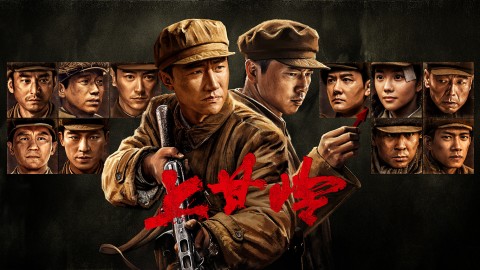Episode 8 recap: Teng Kan is the killer.
When Cao An met Di Ren Jie, he presented all his poems to him, promising to sing them one by one for Di Ren Jie in the future. When Ma Rong saw Di Ren Jie and Cao An meeting, she immediately intercepted them and asked Di Ren Jie where he knew Cao An. However, Di Ren Jie ignored her and instead, after Cao An left, he assigned Ma Rong a task that had to be done flawlessly.
Qiao Tai and Hong Liang were very curious, but Ma Rong didn't tell them anything and simply left. In the early morning, Di Ren Jie hurried to the Teng residence. Teng Kan smiled and said that if Di Ren Jie had arrived a step later, he wouldn't have seen him. Di Ren Jie confidently stated that he would definitely meet Teng Kan today. As they talked more and more, Teng Kan sensed Di Ren Jie's hostility and confronted him directly. Unexpectedly, Di Ren Jie asked about the Four Lacquer Screens and revealed the secrets hidden on the screens. He used his sword to scrape off the special material used for the paintings on the screens, revealing their true appearance.
As the situation turned increasingly unfavorable for him, Teng Kan tried to salvage it by mentioning his relationship with Yin Lian. However, Di Ren Jie had already uncovered the truth and bluntly stated that Teng Kan intentionally spread rumors of his madness, then used the special material that appears when heated to alter the screens. He went to great lengths to design a plan to kill Yin Lian and manipulate public opinion in his favor, all to earn a reputation as a devoted husband. However, Di Ren Jie deduced from Yin Lian's poems and Teng Kan's recent works that Teng Kan had run out of inspiration. Despite knowing about Yin Lian's affair with Xu Kai, he suppressed the information and continued to make Yin Lian write poems for him. In the end, he planned to kill Yin Lian.
Xu Kai and Yin Lian both died from being stabbed seven times, and "seven" was the number of their secret meetings known to Teng Kan. Teng Kan questioned himself if he left any evidence, although Di Ren Jie discovered bloodstains on the horsewhip and speculated that Teng Kan had whipped himself every day to suppress his inner demons, leaving whip marks on his body. Di Ren Jie also falsely claimed that Teng Kan knew that Li Han served at the quarry and that Lady Lai Er personally intervened to redeem him. However, since both Li Han and Xu Kai were already dead, Teng Kan had no evidence to capture him. This made Teng Kan extremely arrogant, and he continued to command his servants to move things until he discovered that the box where Yin Lian's poetry was stored was filled with stones, which made him panic.
Di Ren Jie revealed that he had already instructed Ma Rong the previous night to exchange Yin Lian's poetry with stones, and now they were on their way to Chang'an. All the poems bore Yin Lian's handwriting. In this way, the whole world would know that Teng Kan was a fame-seeking individual, and from then on, he would be ruined, having committed the crime of deceiving the emperor, and he would not escape death.
Seeing himself in such a desperate situation, Teng Kan lost all his spirit and sat down on the ground, appearing both sorrowful and mad. Di Ren Jie and Qiao Tai hurried to the Lai residence and encountered Lady Lai Er, who chose to trap herself in the building and set it on fire, evoking their deep sighs of lamentation.
Ba Zong saw Di Ren Jie successfully solve the case and couldn't help but feel guilty about his past crimes. He quickly asked Ma Rong about Di Ren Jie's thoughts, fearing that Di Ren Jie would take control of both the martial world and the affairs Ba Zong couldn't handle. He didn't dare to say much.
Di Ren Jie specifically bought mahogany and personally made a stringed instrument and gave it to Cao An. He was worried that it might not be suitable, but Cao An thought it was excellent, which made Di Ren Jie happy. On the vast sea, a ship encountered a storm. This route chosen by Wang Li De had never been taken before. The leader on the ship became worried. Wang Li De immediately reassured them, but when the leader entered the cabin, he found all his companions dead. He immediately realized that Wang Li De was behind it. He wanted to turn around and seek revenge but was killed by Wang Li De, who had been keeping an eye on him.
The cook was responsible for cooking. This time, he secretly brought his younger brother on board. His brother wanted to go to the toilet because of a stomachache. He quickly gave him a wooden bucket and told him to take care of it in the bottom of the cabin. He also placed another bucket on top of the wooden planks. In the end, only his brother was not discovered by Wang Li De, and everyone else on the ship was killed. Liu Zhongshi was sent to Penglai to make purchases. Gu Mengbin quickly had the gold and treasures stored away and specifically reminded Yisi Shi not to mention the gold, especially the Baekje gold. Unexpectedly, Liu Zhongshi mentioned it at the welcoming banquet, saying that his two most favorite things in life were geisha and gold. No matter how eloquent Yisi Shi was, he couldn't help but pause upon hearing this and quickly tried to cover up, stating that Penglai didn't produce gold.
Di Ren Jie had summoned Gu Mengbin for three consecutive days, but he hadn't shown up. So today, Di Ren Jie came to find him himself and coincidentally met Liu Zhongshi on his way to Penglai. Liu Zhongshi heard that Di Ren Jie was looking for Wang Li De and wanted to see how Di Ren Jie would handle the case. Yisi Shi intervened and had Cao An perform a song, and Liu Zhongshi agreed, leaving Di Ren Jie ignored on the side.



The first two cases were a waste. They didn't highlight Di Ren Jie's deductive abilities at all. Looking forward to some excitement in the later episodes. There were too many scenes focusing on Di Ren Jie's body movements and language in the first two cases.
His body movements and language should be performed by someone else, and Di Ren Jie should rely on his eyes to act, which would be better. To put it plainly, the first two episodes were overdone, lacking any sense of pressure or tension for the audience.
It felt like once Di Ren Jie arrived, the cases were naturally solved. The foreshadowing wasn't deep enough, and it was not difficult to guess that all the cases would ultimately point to the imperial power.
Overall, it seems like the screenwriter was afraid that the audience wouldn't understand the story. On the contrary, leaving the case details ambiguous and letting the audience guess would create more desire.
It's a good story, but the execution is not good. It lacks the audacity to overturn and start over. They should learn from Wong Kar-wai.
In the second story, the husband kills the adulterous couple, but the entire story portrays the cheaters as if they did nothing wrong. There is no condemnation, and the values depicted are distorted.
Moreover, the final evidence can be considered insufficient. They claim that the wife's manuscripts were sent to the capital city, and these manuscripts were poems that the husband didn't have time to copy.
They use this to prove that all the husband's previous poems were copied from his wife's work? What kind of logic is that? It simply doesn't make sense. If you want to prove that the husband became famous by copying his wife's poems, you should provide evidence showing that the wife wrote a particular poem first, and then the husband used it to gain fame.
In the drama, the logic is that the wife wrote some poems with a similar style to the husband's, so they conclude that the husband must have copied all his previous work. Furthermore, they suggest that the man couldn't possibly write poems as delicate as the woman's.
What kind of stereotypical reasoning is this? Are they serious? Seriously, did the screenwriter never study logic? Any sane person would recognize the insufficiency of this evidence. Can they really convict someone of deceiving the emperor based on this?
Are you alright?
The character Yinlian wasn't properly explained. Why did she and Xu Kai break up in the first place? Was it because of leprosy? Why did she marry the murderer, and why did she have an affair?
What exactly happened between her and Li Han? It doesn't have to be shown on screen, but at least it should be explained. These things are related to Yinlian's character, and by the end, it was still unclear whether she was a talented and loving woman or a manipulative seductress...